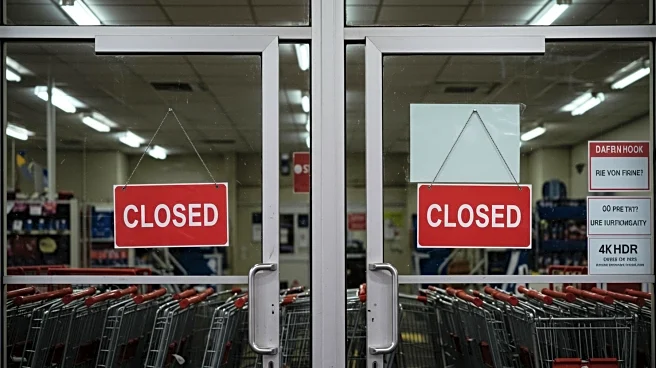What is the story about?
What's Happening?
Kroger has announced plans to close two stores in the Puget Sound Region, specifically in Everett and Kent, due to low performance. The closures are scheduled for October 17 and 18, potentially impacting 360 workers. The United Food & Commercial Workers Local 3000 (UFCW 3000), a union representing grocery and retail workers, criticized the decision, stating it prioritizes profit over the needs of customers and workers. The union expressed concerns about creating food deserts and disrupting the lives of workers already affected by a housing affordability crisis. Kroger had previously announced plans to close 60 stores nationwide over 18 months, including the QFC Mill Creek location and the South End Tacoma Fred Meyer location, which faced community push-back.
Why It's Important?
The closure of these stores by Kroger highlights ongoing challenges in the retail industry, including financial viability and regulatory pressures. The decision could lead to food deserts in affected neighborhoods, impacting local communities' access to groceries. Additionally, the move affects hundreds of workers, exacerbating employment instability amid a housing affordability crisis. The closures reflect broader trends in the retail sector, where companies are increasingly prioritizing profitability in response to theft and regulatory challenges. This decision may influence other retailers facing similar issues, potentially leading to more store closures and job losses.
What's Next?
Kroger plans to offer affected associates positions at other locations, aiming to mitigate the impact on workers. The closures follow a failed merger between Kroger and Albertsons in December 2024, indicating potential strategic shifts in the company's operations. Community push-back against previous closures suggests possible local resistance to these new closures. Stakeholders, including local governments and community organizations, may engage in discussions to address the potential food deserts and employment challenges resulting from these closures.
Beyond the Headlines
The closures raise ethical questions about corporate responsibility and the balance between profitability and community impact. The decision underscores the tension between business strategies and social responsibilities, particularly in areas facing economic and housing challenges. Long-term, these closures could influence public policy discussions on retail industry regulations and support for affected workers and communities.
















